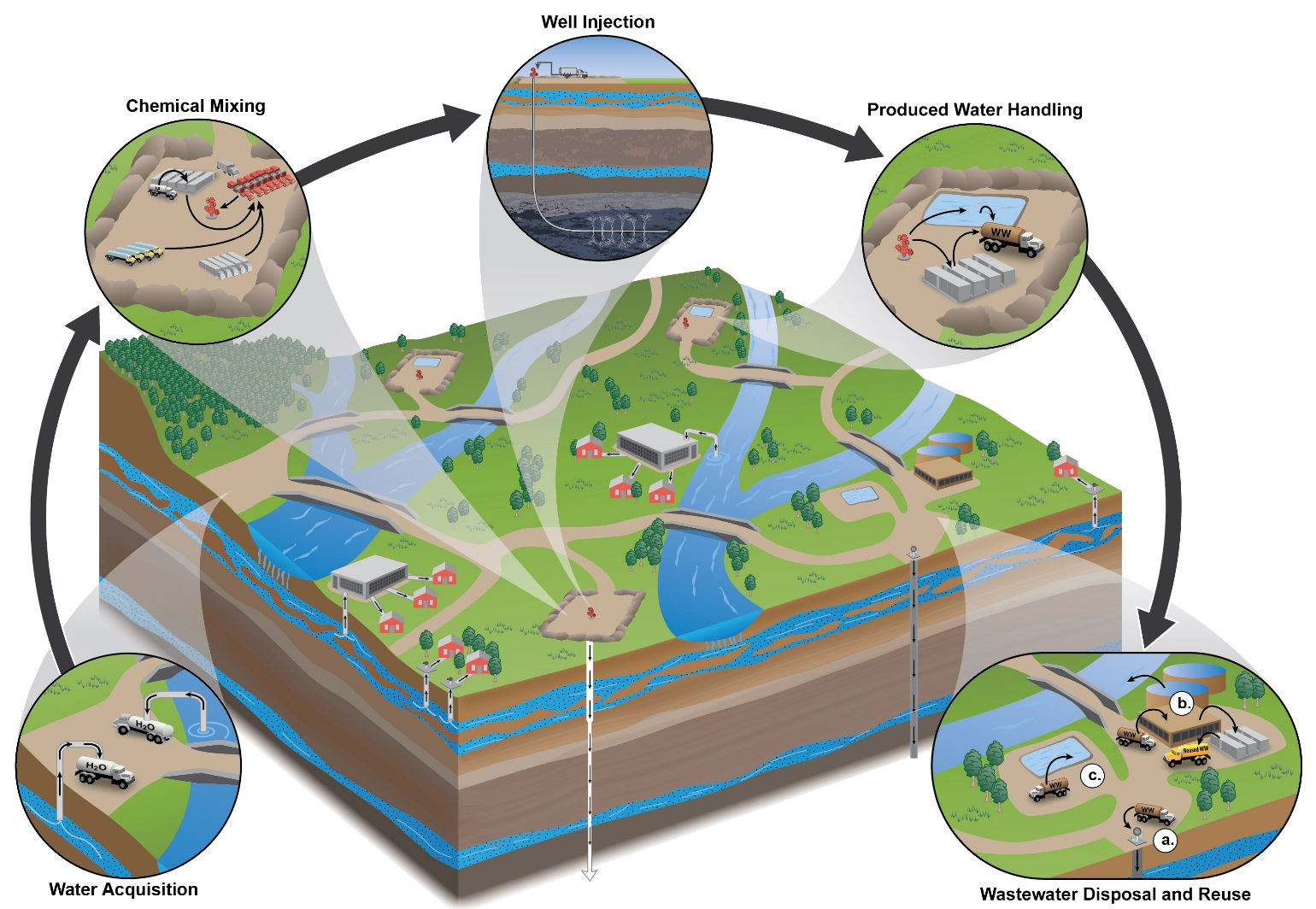Ever since hydrofracking became the number one source of oil in the United States, countries whose economy mostly depend on the selling of crude oil such as Venezuela, Iran, and Russia have begun to experience a significant loss, while Americans enjoy the perks of low prices in gas and electricity. As the U.S has become independent from crude oil, “$100 billion in annual savings [have been generated] by avoiding foreign oil.”[1]However, generating cheap oil from deep fracking in American soil also has tremendous consequences on the environment and human health.
The way fracking is done is by drilling underground and injecting “millions of gallons of water, sand, salts, and chemicals – all too often toxic… into the sub-surface of rock formation at extremely high pressure, to fracture the rock and extract raw fuel.”[2]This process allows for the stimulation of soil and increase the flow of oil, to allow companies to extract fossil fuels for oil and natural gasses.

Image Source: Pace Law Library Guides – Pace University
One of the prime components for the production of natural gas is methane, which according to the National Oceanic and Atmospheric Administration (NOAA), it “is 25 times more potent in trapping heat in the atmosphere than carbon dioxide.”[3]At the same time, it has been studied that fracking “could trigger earthquakes, poison livestock, and overburden wastewater systems”[4]which is detrimental for the environment.
Upon scientific research conducted by Duke University in 2011, traces of flammable methane were found in “68 private groundwater wells across five countries in northern Pennsylvania and southern New York.”[5]According to the data, the samples retrieved from areas closer to the wells extremely high levels of methane which could cause serious health issues to communities living nearby, as “carcinogenic chemicals may escape during drilling and contaminate groundwater around the fracking site”
It is worth noting that methane is a chemical not regulated by the EPA in public water systems. Methane has been linked to many illnesses including short term headaches, nosebleeds, nausea to “cancer, organ damage, nervous system disorders”[6], and congenital disabilities. However, other toxic chemicals used for fracking could be causing other health effects, as wells continue to get injected with toxic chemicals which could fracture the wells and allow these to wonder in soil and spread through rivers across the country.

Image Source: EPA
As the Trump administration continues to demonstrate no concerns about the environment, the new laws on oil and gas companies allow them to drill wells with little to no regulation, which is alarming, taking into consideration the process these companies have on the environment and human health.
Sources:
[1] Hanson, Victor Davis. “The Fracking Industry Deserves Our Gratitude.” National Review, National Review, 6 July 2017, www.nationalreview.com/2017/07/fracking-industry-united-states-energy-independence-oil-middle-east-venezuela/.
[2] West, Larry. “All About Fracking or Hydrofracking.” Thoughtco., Dotdash, 6 Jan. 2018, www.thoughtco.com/fracking-hydrofracking-or-hydraulic-fracturing-1204048.
[3] Hoffman, Joe. “Potential Health and Environmental Effects of Hydrofracking in the Williston Basin, Montana.” Teach the Earth the Portal for Earth Education, NAGT, 15 Feb. 2019, serc.carleton.edu/NAGTWorkshops/health/case_studies/hydrofracking_w.html.
[4] West, Larry. “All About Fracking or Hydrofracking.” Thoughtco., Dotdash, 6 Jan. 2018, www.thoughtco.com/fracking-hydrofracking-or-hydraulic-fracturing-1204048.
[5] “What Is Fracking and Why Is It Controversial?” BBC News, BBC, 15 Oct. 2018, www.bbc.com/news/uk-14432401.
[6] Hoffman, Joe. “Potential Health and Environmental Effects of Hydrofracking in the Williston Basin, Montana.” Teach the Earth the Portal for Earth Education, NAGT, 15 Feb. 2019, serc.carleton.edu/NAGTWorkshops/health/case_studies/hydrofracking_w.html.

Be First to Comment